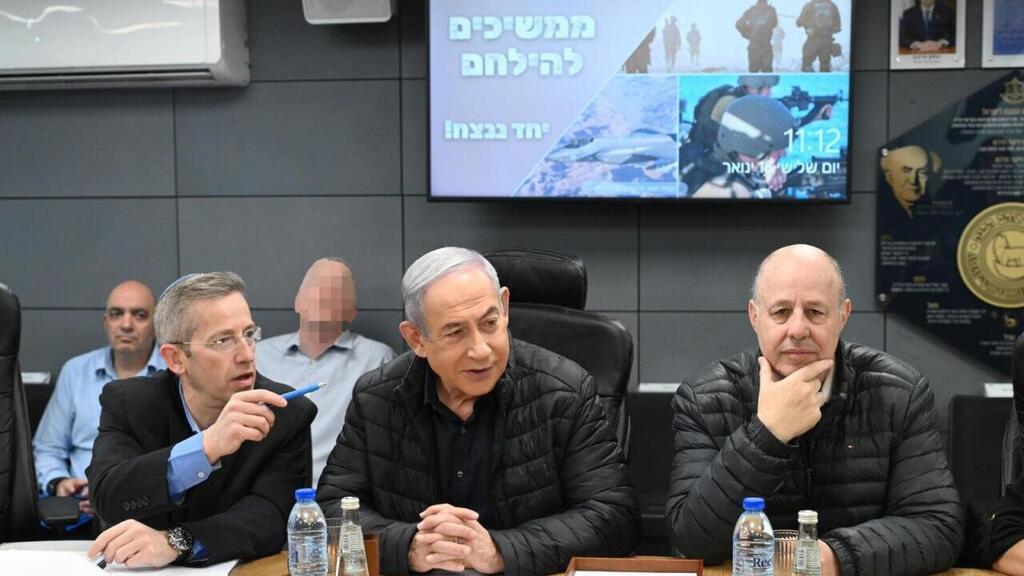A new survey published by the non-profit organization Tmunat Nitzachon (Victory Image) reveals, for the first time, what the public in Israel thinks about Prime Minister Benjamin Netanyahu's plan for the "day after" the war.
Read more:
While there is broad support for the plan from both the right and the left, the public doubts its effectiveness in the civil and political spheres, according to the survey released on Wednesday by Victory Image. The survey was conducted by the company Panel Project HaMidgam, and included 495 respondents from both the Jewish and Arab communities in Israel.
2 View gallery


Prime Minister Benjamin Netanyahu (center) during a meeting of the Security Cabinet
(Photo: GPO)
The context for the survey is a new plan recently presented by Netanyahu to the Security Cabinet for the "day after" the current war in Gaza. In the security sphere, the plan includes continued Israeli control over the Gaza Strip, disarmament and the establishment of a "southern barrier" to prevent smuggling from Egypt.
In the civil sphere, the plan includes rehabilitation of the Gaza Strip by a foreign state agreed upon by Israel, transferring control of the Strip to civilian entities with managerial experience, replacing the UN Palestinian refugee agency UNRWA with other international relief agencies.
In the political sphere, the plan proposes opposition to unilateral recognition of a Palestinian state, rejection of international dictates for a permanent settlement with the Palestinians and striving for such an agreement only through direct negotiations between the parties, without preconditions.
According to the survey findings, 62% of Israelis support Netanyahu's "Day After" plan, compared to only 16% who oppose it. However, only 23% believe in Israel's ability to fully realize all the plan's objectives. The public thinks its security objectives are the most feasible (41%) but expresses doubt regarding the ability to realize its civil (25%) and political (23%) objectives to a large or very large extent.
Support is high for Saudi, UAE involvement in post-war Gaza
Regarding ways to promote solutions in the civil sphere, there is broad support among the Israeli public for the involvement of Saudi Arabia and the United Arab Emirates in managing the Gaza Strip in the aftermath of the war.
According to the findings, 58% of Israelis support the idea that, alongside Israel's security responsibility for the Gaza, Saudi Arabia or the United Arab Emirates would take responsibility for managing the Gazan population after the war. Support rates were found to be high among most right-wing voters (Likud and Israel Beitenu 55%, Religious Zionism, Shas and United Torah Judaism -50%) and among center-left voters (National Unity/State Camp 61%, Yesh Atid 67%, Labor and Meretz 50%).
2 View gallery


Displaced Gazans line up for food in Rafah for the fast-breaking evening meal during Ramadan
(Photo: Mohammed Abed / AFP)
Similar support was also received regarding the question of which countries should be involved in a more moderate management of the Gaza Strip: The United States (40%), the United Arab Emirates (30%), and Saudi Arabia (23%) were the three countries that received the most support.
The survey examined what Israelis think about the concept of "absolute victory" coined by Netanyahu at the start of the war. The majority of Israelis tend to think that the concept serves the war's objectives: 25% stated it does so to a large or very large extent, and 23% to a moderate extent. However, 38% believe that Israel's ability to achieve "absolute victory" today does not exist or exists only to a minor extent.
According to the survey, apart from the dismantling of Hamas and the return of the hostages, the leading ways to achieve "absolute victory" in the war include establishing Israeli settlements in the Gaza Strip (26%), de-radicalizing educational, welfare, health and religious institutions (25%), and the rehabilitation of the Gaza Strip by a foreign state agreed upon by Israel (13%).
Israelis doubtful of chances for 'absolute victory'
"The survey findings show that there is broad support in Israel for the need for absolute victory in the war. However, the question marks regarding the ability to achieve it must raise a red flag among Israeli decision-makers," founders of the nonprofit Victory Image, Danel Ben-Namer and Tal Louria, said in a statement.
"They must understand that a military decision alone is not enough. Establishing a new civilian agenda to replace Hamas is a civilian goal no less important than achieving Israel's military objectives in the war. The consensus among right and left-wing voters regarding the need for the involvement of the Abraham Accords countries, led by Saudi Arabia and the United Arab Emirates, in managing and rehabilitating the Gaza Strip, should guide the Israeli government in the direction of realizing civilian objectives on the way to achieving an absolute decision."


